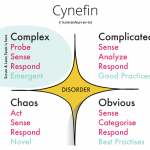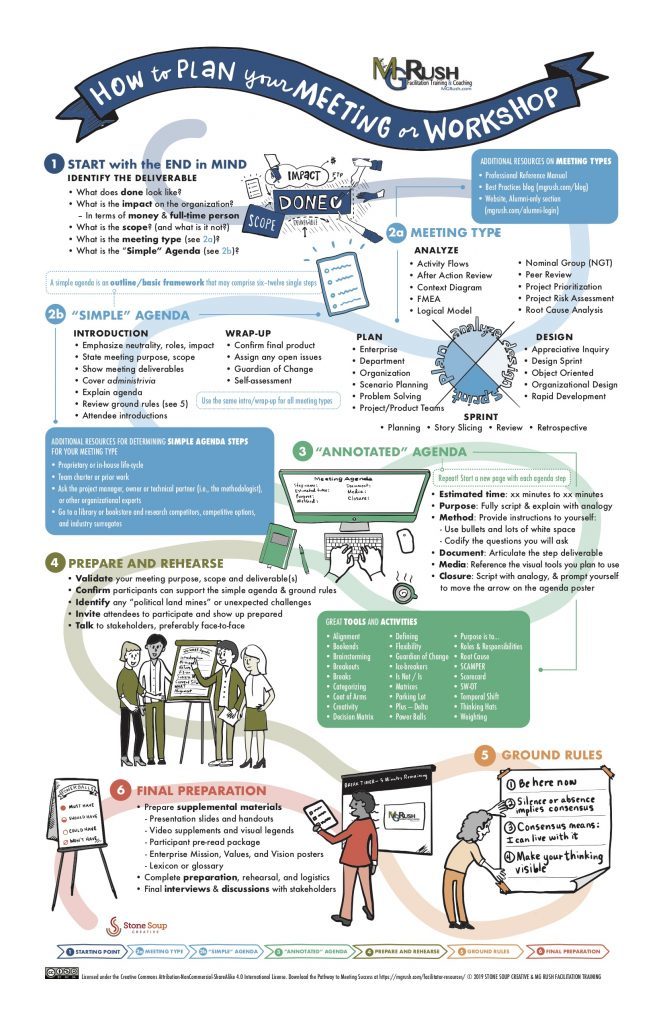The Global SCRUM GATHERING® Austin was kicked off on a warm Monday morning in May by Daniel Pink. Because his research focused on time and timing, Daniel compiled and published his results and findings in his newest book When: The Scientific Secrets of Perfect Timing. Additionally, his presentation averaged a five-star rating from the 224 of us who checked in live.
During the Global SCRUM GATHERING kickoff, Daniel stressed the importance of two findings, highly relevant to facilitators:
- Regardless of how much time is allotted, real work does not begin until the meeting or project reaches its midpoint. Consequently, in a four-hour meeting, at the two-hour mark, someone will remark that “half our time has expired” and suddenly participants get serious. Similarly, at the project level, once the project reaches its midway point, contributors develop a sense of urgency and step up their contributions. Half-way warnings. Additionally, it doesn’t matter if you allow one hour, one week, or one month—be on the lookout for the halfway point.
(Keeping this in mind, with a powerful Introduction, using our 6-Step Method, you will NEVER wait half-way to help a team become productive.)
- “Endings” are more important than beginnings when it comes to memory and recall. While smooth starts remain critical, participants will evaluate you and the value of the meeting by the last five minutes.
(ie. What did we accomplish? (Review) What has changed in my world? (Next Steps) Who is going to manage xxxxxx? (Assignments) Our professional Review and Wrap recommends a fourth step for a solid close, get some feedback on how you did. Click the links for a good refresher on solid Introduction and Review and Wrap activities that no meeting, even 50 minutes in duration, should be without.)
The Global SCRUM GATHERING conference progressed during the week with topics covered by this author including . . .
- Why Agile Transformations get stuck. Traditional (non-Agile) leadership mindsets, organizational structures, and slow-moving cultures provide leading indications. Because too many organizations focus on framework implementation, ignoring the human factor.
- How to mitigate backdraft among teams—those uncomfortable feelings or negative reactions that arise from team and organizational dysfunction.
- Agile conflict resolution that frankly was nowhere near as robust as the MGRUSH technique.
- Agile Potlucks and how to create effective and long-lasting communities of practice.
- How to lead Agile organizations by leveraging heuristics. Improving decision quality by exploiting the structures of information and the environments in which they are applied. Reference here to the Cynefin Framework. (Obvious-Complicated-Complex-Chaotic)
- “The Death of Agile Transformations” and how to avoid them. Personally, loved the Cuckoo Effect:
“Any foreign innovation in a corporation will stimulate the corporate immune system to create antibodies that destroy it.”

Global SCRUM GATHERING
The Global SCRUM GATHERING may be summarized by Peter Drucker’s quotations above and below referenced during the session:
“The greatest danger in times of turbulence is not the turbulence; it is to act with yesterday’s knowledge.”
- How to be Agile enough to reinvent yourself (Stacey Ackerman was wonderful).
- Roger Brown provided compelling evidence and financials to hire an Agile coach (or, we would argue, a meeting and facilitation coach).
- Using Customer Journeys to help prioritize Product Backlogs.
- Shu-Ha-Ri or mastering Scrum—“first learn, then detach, and finally transcend.”
- The difference between Machine Learning and Artificial Intelligence. (All M.L. is A.I. but not all A.I. is M.L.) Be sure to use a data scientist or A.I. engineer to help build a methodology for your A.I. or M.L. workshops.
- Chris Messina, creator of using hashtags (initially on Twitter and now everywhere) closed with refreshing material and the importance of wealth—defined as the quantity and quality of connections with others.
Control the Room
Terrence concluded a week in Austin TX as a speaker at Douglas Ferguson’s Voltage Control-sponsored “Control the Room 2019”—Austin’s 1st Annual Facilitator Summit. Douglas, an alumnus and a very smart and compassionate guy (and professional Design Sprint facilitator), used the conference to break down the silos of facilitation. Succinctly summarized, In his words:
“to move past the guilds and methodology-centric gatherings and convene facilitators of all kinds to build rapport, learn, and grow together.”
Priya Parker (“The Art of Gathering”) opened the day with remarkable personality and humaneness. As reported in the following article:
“Her 90-minute talk was a pure delight and received a standing ovation. She is a stratospherically talented facilitator.”
You may access summaries of all “Control the Room” presentations HERE. The “Control the Room 2019” artwork captures our presentation segment. It has been borrowed from Douglas’ report, so additional kudos to Patricia Selmo for the graphic recording. “Control the Room” generated high energy, and warm camaraderie, and will return to Austin on a regular basis. Therefore, anybody who facilitates meetings would benefit from attending.
After recently working with Julia Reich, the graphic recorder of Stone Soup Creative, we have developed a strong affinity for graphic recording. Julia should be applauded (and hired) because her Meeting Pathway to Success provides a simple-to-follow guide for complex events called meetings (or workshops). You can download your copy HERE, or visit our Facilitation Store to order a poster-size copy. Meanwhile, below is her delightful infographic based on the MGRUSH Professional Curriculum when she attended in Columbus OH.
______
Don’t ruin your career by hosting bad meetings. Sign up for a workshop or send this to someone who should. MGRUSH workshops focus on meeting design and practice. Each person practices tools, methods, and activities daily during the week. Therefore, while some call this immersion, we call it the road to building high-value facilitation skills.
Our workshops also provide a superb way to earn up to 40 SEUs from the Scrum Alliance, 40 CDUs from IIBA, 40 Continuous Learning Points (CLPs) based on Federal Acquisition Certification Continuous Professional Learning Requirements using Training and Education activities, 40 Professional Development Units (PDUs) from SAVE International, as well as 4.0 CEUs for other professions. (See workshop and Reference Manual descriptions for details.)
Want a free 10-minute break timer? Sign up for our once-monthly newsletter HERE and receive a free timer along with four other of our favorite facilitation tools.
______
With Bookmarks no longer a feature in WordPress, we need to append the following for your benefit and reference
- 20 Prioritization Techniques = https://foldingburritos.com/product-prioritization-techniques/
- Creativity Techniques = https://www.mycoted.com/Category:Creativity_Techniques
- Facilitation Training Calendar = https://mgrush.com/public-facilitation-training-calendar/
- Liberating Structures = http://www.liberatingstructures.com/ls-menu
- Management Methods = https://www.valuebasedmanagement.net
- Newseum = https://www.freedomforum.org/todaysfrontpages/
- People Search = https://pudding.cool/2019/05/people-map/
- Project Gutenberg = http://www.gutenberg.org/wiki/Main_Page
- Scrum Events Agendas = https://mgrush.com/blog/scrum-facilitation/
- Speed test = https://www.speedtest.net/result/8715401342
- Teleconference call = https://youtu.be/DYu_bGbZiiQ
- The Size of Space = https://neal.fun/size-of-space/
- Thiagi/ 400 ready-to-use training games = http://thiagi.net/archive/www/games.html
- Visualization methods = http://www.visual-literacy.org/periodic_table/periodic_table.html#
- Walking Gorilla = https://youtu.be/vJG698U2Mvo

Terrence Metz, president of MG RUSH Facilitation Training, was just 22-years-old and working as a Sales Engineer at Honeywell when he recognized a widespread problem—most meetings were ineffective and poorly led, wasting both time and company resources. However, he also observed meetings that worked. What set them apart? A well-prepared leader who structured the session to ensure participants contributed meaningfully and achieved clear outcomes.
Throughout his career, Metz, who earned an MBA from Kellogg (Northwestern University) experienced and also trained in various facilitation techniques. In 2004, he purchased MG RUSH where he shifted his focus toward improving established meeting designs and building a curriculum that would teach others how to lead, facilitate, and structure meetings that drive results. His expertise in training world-class facilitators led to the 2020 publication of Meetings That Get Results: A Guide to Building Better Meetings, a comprehensive resource on effectively building consensus.
Grounded in the principle that “nobody is smarter than everybody,” the book details the why, what, and how of building consensus when making decisions, planning, and solving problems. Along with a Participant’s Guide and supplemental workshops, it supports learning from foundational awareness to professional certification.
Metz’s first book, Change or Die: A Business Process Improvement Manual, tackled the challenges of process optimization. His upcoming book, Catalyst: Facilitating Innovation, focuses on meetings and workshops that don’t simply end when time runs out but conclude with actionable next steps and clear assignments—ensuring progress beyond discussions and ideas.




